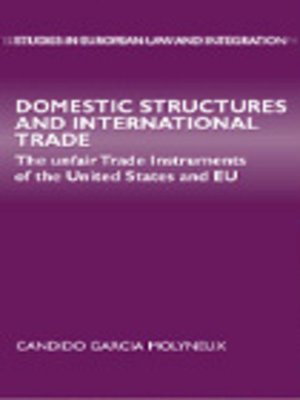Domestic Structures and International Trade
ebook ∣ The Unfair Trade Instruments of the United States and European Union · Studies in European Law and Integration
By Candido Garcia Molyneux

Sign up to save your library
With an OverDrive account, you can save your favorite libraries for at-a-glance information about availability. Find out more about OverDrive accounts.
Find this title in Libby, the library reading app by OverDrive.



Search for a digital library with this title
Title found at these libraries:
| Library Name | Distance |
|---|---|
| Loading... |
This book places international trade law within an economic, political and sociological context, contending that globalisation is characterised by both homogeneity and diversity. However, while implying changes within contracting parties, globalisation only results in a 'thin' homogeneity. Furthermore, globalisation is the result of the interaction, negotiations and policies between states. From this perspective, the book attempts to explain trade policy as resulting from domestic factors. Thus, if globalisation is characterised by diversity, how do such differences affect the trade policy of states in an era where nearly everything is subject to commerce?
The book focuses on the US and the EC, analysing different institutional and substantive aspects of unfair trade instruments, such as anti-dumping and countervailing measures and market access instruments. Domestically, it focuses on both constitutional and socio-economic constraints. The book considers political action prescribed by formal constitutions in a wider socio-economic context, rejecting the a-historical and structurally blind normative idea of free trade.







